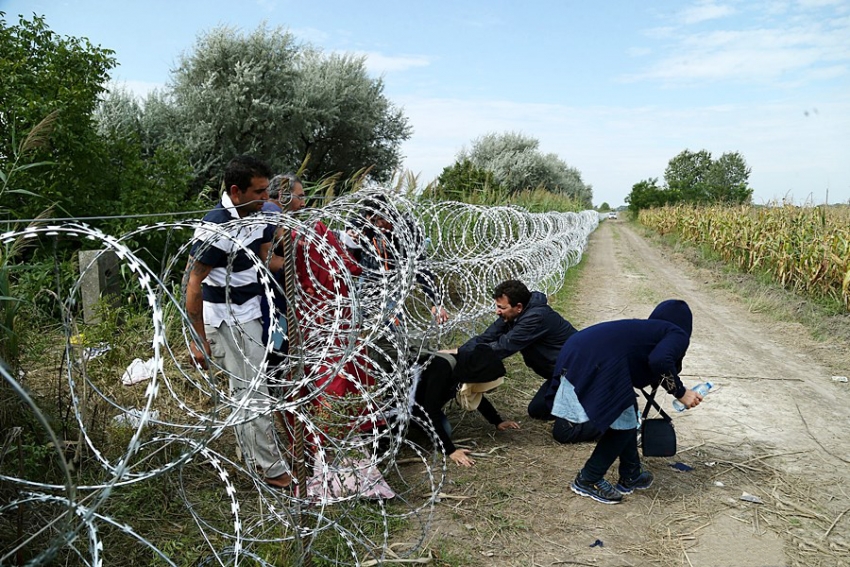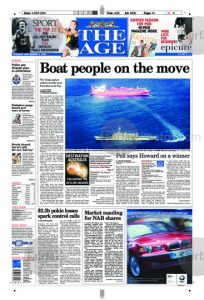
‘You’re not helping’: The problematic liberal narrative on race and migrants
by Amber Jasmine Quraishi
Editor Update: This article was selected as runner up in our 2017 Blog Prize competition. Well done Amber.
The liberal left is quick to distance themselves from the right-wing and their “racist” discourse when discussing race and migration. When Germany took in a record 1.1 million refugees in 2015, the German magazine ‘Der Spiegel’ admitted the country had become “a nation split in two”. The article seemingly creates a dichotomy between the moral left and the immoral right wing. This dichotomy is continuously upheld by nearly all parts of the left wing, at times, even by myself. The discourse of civic (liberal) nationalism within its very definition uses the liberal rhetoric of ‘freedom, tolerance, equality and individual rights’ (Tamir, 1993). However, it is this very rhetoric, which exposes the problematic narrative of left liberalism. In this article, I will be exposing two issues within the problematic narrative of left liberalism. These issues lie within the language we, the left, use, and actions we take towards issues such as migration. These are the issues which not only inhibit the representation of migrants but inhibit our own involvement in the political discourse.
The first problematic within the liberal discourse of migrants is the narrative of nationalism itself. In ‘Imagined Communities’, Benedict Anderson describes nationalism as a cultural artifact that uses language and print capitalism to take concrete shape (1983). This idea is still compatible with neo-nationalism. However, the concept becomes problematic when you realise the narrative has remained relatively unchanged since its initial emergence in the Enlightenment era. Anderson suggests that the language first used to construct nationalism as a social reality has become embedded. Does this relate to the ‘migrant crisis’? The answer is absolutely; through the embedding of problematic racist narratives. Enlightenment nationalism produced a paradox in which the nation presented ‘itself as simultaneously open and closed’ (1983, p. 148). This paradox was born through the debate: who is part of the nation? Žižek, when exploring the ideological responses to the refugee crisis, mirrors this argument. He states that the problem with nationalism is not found in ‘foreigners’ but instead ‘our own (European) identity’ (2016, p.70). This suggests that the liberal value of ‘individual rights’ in itself produces an exclusive form of nationalism. It produces a discourse which subconsciously creates a ‘we’ and ‘them’ ideology; that ‘democratic openness is based on exclusion (Žižek, 2016, p. 69).

‘Boat People on the Move’ published in THE AGE (Melbourne) on 4th September 2001
This subconscious othering was evident in the Tampa Affair in 2001 where the Liberal Party, fronted by Howard, refused permission for 438 refugees to cross the border into Australia. The decision, described by Gale, was supported through the ‘Liberal Party outcry of ‘we decide who comes to this country and the circumstances in which they come’ (Howard, 2001, 10). The liberal’s use of the ‘we’ discourse exemplifies the inner paradox of liberal left ideology. It simultaneously supports the individualistic perspective of left-liberalism, furthering the image of being ‘for the people’; whilst creating a disparity between liberals and migrants. Žižek furthers this critique of nationalist liberal populism: ‘centrist parties reject the open racism of anti-migrant populists, but they simultaneously profess to ‘understand the concerns’ of ordinary people… [enacting] a more ‘rational’ version of the same politics’ (p.20). Therefore, although the liberal may distance themselves from far-right politics, they subtly promote the same othering ideology, just through a more ‘moral’ discourse.
This moral discourse is the second problematic within liberal left ideology as it promotes individualism and tolerance. The issue lies within this exact language. Tolerance of migrants and the acceptance of migrants are two extremely different pictures. An acceptance of migrants would mean opening the borders and treating them as civilians of the nation. Tolerance, however, is the liberal left’s secret to moral superiority. It allows them to be seen as opposite to anti-migration far-right parties, but at the same time, know full well that open borders will never happen. Žižek demonstrates this hypocrisy rather coherently: ‘they play the Beautiful Soul, which feels superior to the corrupted world while secretly participating in it… [exerting] moral superiority’ (p. 8). This hypocrisy allows liberal lefts to protest for open borders without actually engaging in active solutions to refugee and migrant crises. It allows to wave their banners and hand-painted signs but does not force them into tackling the existing migrant narrative. It is as if feeling guilt is easier than solving the problem. This is a very typical reaction of the liberal left, using ‘white cultural politics’ as a means to keep the narrative away from the migrant’s voice (Gale, 2004, p.322). Žižek comments on this liberal left response as the biggest problem as it boxes migrants permanently into the category of victims. He suggests that these white cultural politics have become the only ground for active response: ‘white man’s guilt [suggests] we are the only active ones… and when the refugees become too active, they are dismissed as terrorists’. This is the most confusing part of the liberal narrative, it’s as if we cannot allow anyone but ourselves to claim the moral high ground, and yet, never take direct moral action against the issue.
I myself, who identifies as left wing, have had many a tiresome conversation with a “liberal leftie”. Conversations where they have regurgitated insults of centrist and right-wing parties for being ‘racist’ with no real counter-argument. It is sad to say that I really haven’t heard the liberal left have a solution to the problems they expose in a long time. It has become far too easy for the liberal left to ‘cry harassment‘ and block an opposing argument than it is to engage in the political discourse. The Liberal left advocating for open borders is not a solution but instead a wash-away phrase, full of drama and theatrics to chant during a protest. It doesn’t identify with the migrant narrative. It doesn’t even promote the humanitarianism we supposedly promote. It is an empty phrase just as many of our left-wing ideas have become. No longer are we focusing on the problem, but instead, our own identity. We’ve become so desperate to distance ourselves from the right, we’ve distanced ourselves from the entire discourse. The liberal left must stop focusing on the right as their biggest opponent and realise it is their lack of solutions and their own oppositionist attitude instead. If the left can unify ideas and create a stronger counter-argument to the far-right narrative of migration, perhaps we may finally be recognised as a serious opponent to the dominant right-wing discourse.
References
Top picture:> Syrian refugees attempt to cross into Hungary near the Serbian border. (Gémes Sándor/SzomSzed / Wikimedia Commons)
Is the Ugly German Back? Flames of Hate Haunt a Nation . Spiegel online (accessed 5.21.17).
Othering 101: What Is “Othering”? | There Are No Others. (accessed 5.21.17).
Migrants, racists and the left | spiked. (accessed 5.21.17).
Anderson, B. (2006). Imagined Communities: Reflections on the Origin and Spread of Nationalism. London: Verso.
Gale, P. (2004). ‘The Refugee Crisis and Fear: Populist Politics and Media Discourse’, Journal of Sociology, 40(4), pp. 321-340
Tamir, Y. (1993). Liberal Nationalism. Princeton: Princeton University Press.
Žižek, S. (2016). Against the Double Blackmail: Refugees, Terror and Other Troubles with the Neighbours. London: Penguin UK.

Thank you, this is the most succinct and accurate description of liberalism and migration I have come across. Well written and insightful.
Thank you for your kind words